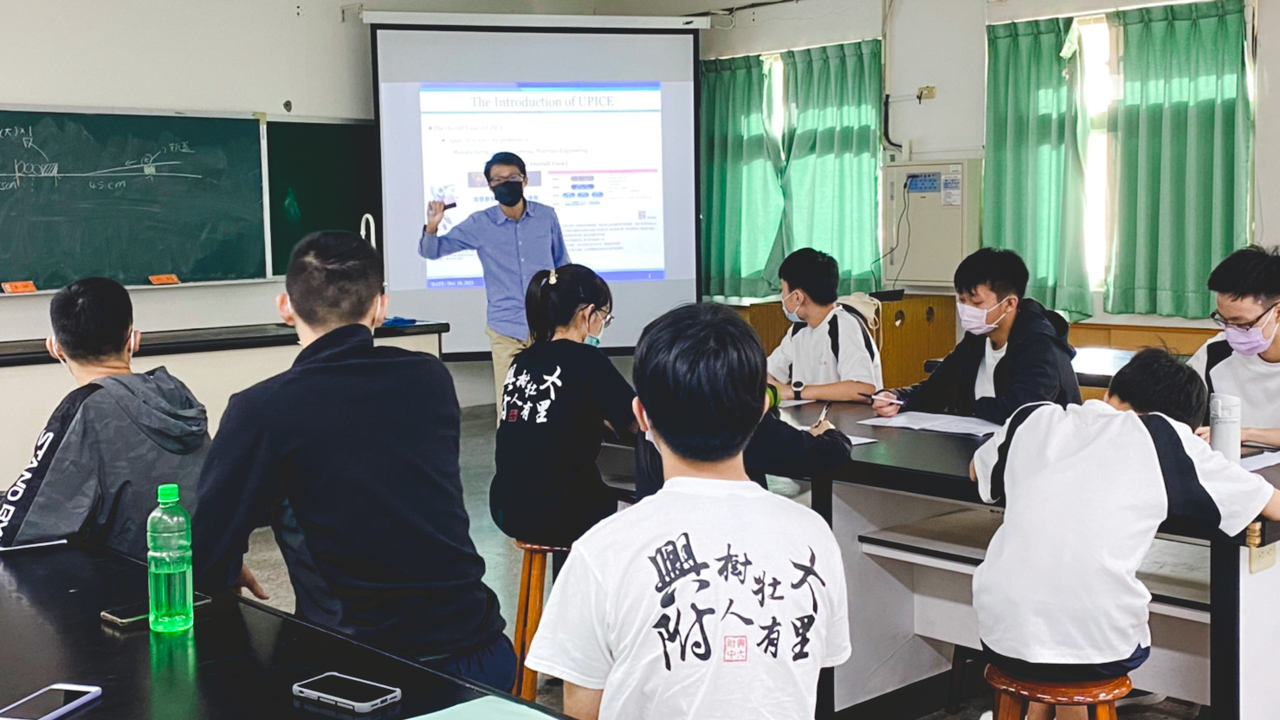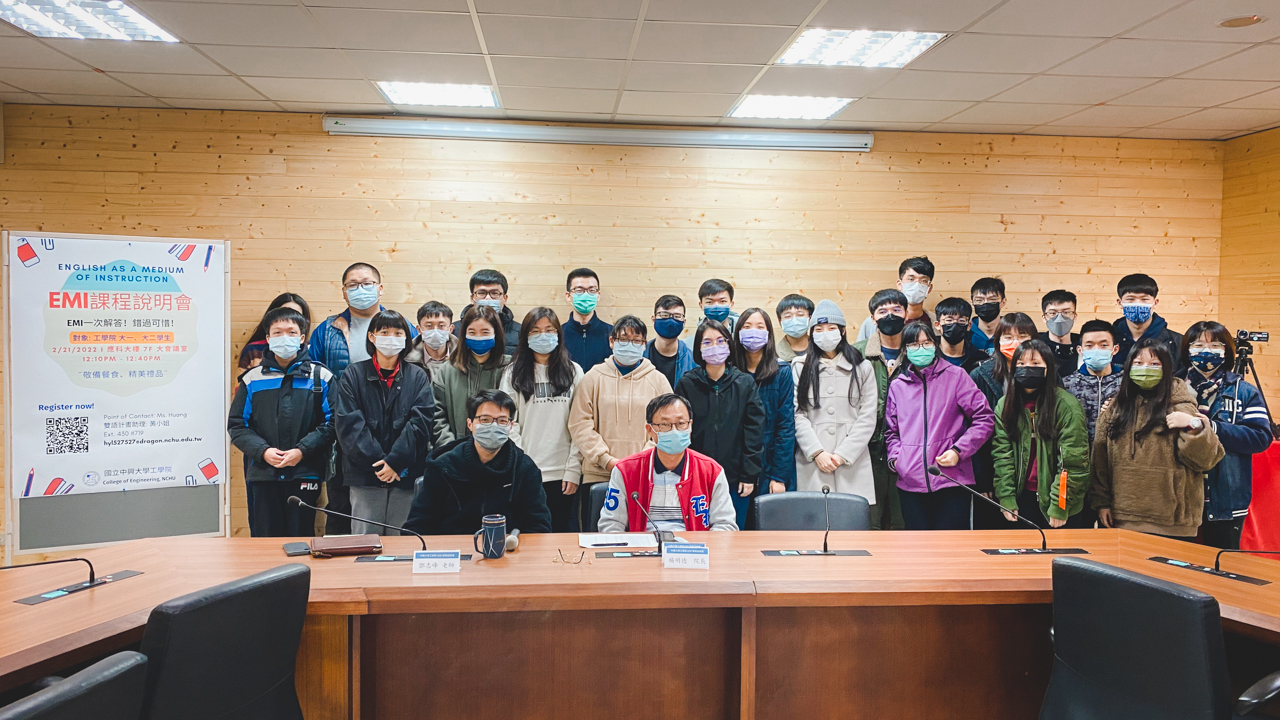Abstract
To cultivate talents with advanced engineering and technology expertise, integration and innovation ability, and international perspective, the College of Engineering, in compliance with the national vision of Bilingual Nation 2030, has made “creating a bilingual-friendly learning environment and increasing engineers’ international competitiveness” its goal and built a comprehensive strategy for the creation of an English-learning environment, striving to enhance the English ability of its faculty members and students.
To promote bilingual education, the College has been offering courses using English as the medium of instruction (EMI). In 2021, it established the EMI Promotion Team, which consists of eight members from its departments, institutes, and programs. The team has held six meetings for the discussion and implementation of the objectives of the program. In 2022, the College established the EMI Advisory Committee, inviting three experts from at home and abroad to serve as the advisory members. The committee has held meetings for the review and supervision of the planning of relevant courses and activities. The College has also employed two full-time EMI assistants to work with intercollegiate administrative units on the implementation of EMI workshops and seminars. For the reference of teachers when they are planning courses and of teaching assistants when they are applying for subsidies, the College has stipulated the “Guidelines for the Use of Funds for the Programs on Bilingual Education for Students in the College of Engineering of National Chung Hsing University.” The “Guidelines for Rewarding the Participation in English Proficiency Tests by Teachers, Staff, and Students in the College of Engineering of the National Chung Hsing University” has been stipulated for the sake of encouraging faculty members and students to take English proficiency tests. To help teachers improve their EMI ability, the College has worked with the University’s Center of EMI to promote Certificate in EMI Skills Online Courses designed by Cambridge Assessment English. It has also stipulated the “Regulation of Research Project and Paper Competition (English as Medium of Competition) of the College of Engineering of the National Chung Hsing University” and worked with the University’s Language Center to offer English for General Engineering, a course using English for specific purposes (ESP), to help students build a solid foundation in English. To improve the bilingual learning environment on campus, the College continues to work with its departments, institutes, and programs to create multimedia space for bilingual education.
The College had 32 EMI teachers for this academic year, which accounted for 23% of the total number of its teachers (expected KPI: 3%). Together they offered 45 EMI courses as follows:
(1)Face-to-face courses: There were 15 undergraduate level courses, accounting for 3% of the total number of courses at the same level (expected KPI: 1%); 18 master’s level courses, accounting for 10% of the total number of courses at the same level (expected KPI: 10%); and four doctoral level courses, accounting for 22% of the total number of courses at the same level (expected KPI 22%).
(2) Online courses: The College invited scholars from the University’s Southeastern Asian partner schools and international teachers recommended by its departments and institutes to offer seven online elective courses for the Summer School in this academic year for undergraduate, postgraduate, and doctoral students. The courses accounted for 2.3% of the total number of courses provided by the College (expected KPI: 1%).
(3) Digital courses: There were three undergraduate level digital mini courses in this academic year, accounting for 1% of the total number of courses provided by the College (expected KPI: 1%).
To help its teachers broaden international perspective and enhance EMI capacity, the College appointed Assistant Professor Jyun-Rong Zhuang of the Department of Mechanical Engineering and Assistant Professor Chieh-Ting Lin of the Department of Chemical Engineering as full-time EMI teachers in 2021. It also employed two full-time EMI assistants in April, 2023. To support its teachers in EMI education, the College has provided a variety of subsidy measures and empowerment courses. (1) The College has compiled an EMI handbook for engineering education for its teachers to use. (2) It held an EMI workshop in which Dr. Chih-Ping Lin (Dean of the College of Engineering of National Yang Ming Chiao Tung University) was invited to share his EMI strategies and skills. (3) It has provided four EMI books, including The Ultimate Guide to Teaching in English, for the reference of its teachers. (4) It continues to encourage its teachers to take Certificate in EMI Skills Online Courses designed by Cambridge Assessment English. In 2021, the University set a national record in Taiwan with as many as 183 teachers from its nine colleges passing the certification. Among them 41 are from the College itself, accounting for 22.4% of the total number of certificated teachers from the University and 30% of the total number of teachers from the College (expected KPI: 10%).
In 2021, there were 524 students taking undergraduate level EMI courses, 373 students taking master’s level EMI courses, and 54 students taking doctoral level EMI courses. Together they added up to 951 students and accounted for 6% of the total number of students taking courses provided by the College (expected KPI: 1%). To attract new students and promote EMI courses and international degree programs, the College held three explanatory meetings and one teaching assistant workshop. (1) The College held the University Experience Project – Introduction of EMI at the NCHU Affiliated High School on September 13, 2021, which saw the participation of about 500 people. (2) It held an EMI course explanatory meeting on February 21, 2022, which saw the participation of 40 people. (3) It held a dual degree explanatory meeting on April 15, 2022, which saw the participation of 54 people. (4) It held a TA experience sharing workshop on May 25, 2022, inviting two senior teaching assistants to share their experiences and introduce skills of shooting course videos to help EMI teaching assistants improve their basic skills and exchange ideas. The workshop saw the participation of 19 people.
To help its students develop systematic thinking and increase international competitiveness, the College encouraged undergraduate and postgraduate students to participate in research project and paper competitions held from June 7 to 9, 2022. There were 25 groups of undergraduate students (six of which used English as the only medium) and 53 groups of postgraduate students (nine of which used English as the only medium) participating in the competitions. To recognize them for using English to present their research results, the College awarded them EMI prize money in addition to the original prize money, giving them a rare and valuable experience and honor. To encourage students to improve their English ability, the College has established a reward system for English proficiency tests, providing a generous amount of prize money and subsidies for registration fees to alleviate students’ financial burdens. There were nine students receiving the rewards and subsidies in this academic year.
The University officially established the Center of EMI on August 1, 2021, and affiliated it with the Office of Academic Affairs. The Center of EMI is dedicated to promoting EMI courses on campus, holding teacher training workshops and seminars, planning online EMI teacher training courses, promoting the student English proficiency testing system, and implementing reward measures for English proficiency tests. With the coordination of the Center of EMI, the College of Engineering and the College of Life Sciences were called together to hold three EMI course promotion and discussion meetings with the Vice President of Academic Affairs as the chairperson. Matters relevant to EMI/ESP/EAP (English for academic purposes) courses were discussed in the meetings to strengthen teachers’ EMI capacity and deepen students’ English abilities.
In terms of broadening the international perspective of faculty members and students, the University has held foreign language workshops, implemented learning companion programs of the International Pioneer Club, recruited foreign EMI teachers, and organized the International Cultural Festival. The College also played its part in strengthening the connection between the University and the industry. (1) The University signed an MOU with President Jackie Chang of Delta Electronics Thailand and held an exchange seminar to provide students with opportunities to serve as interns in multinational enterprises. (2) The University discussed matters of the dual degree program with its partner school Utah State University (USU). Students completing the program will receive bachelor’s degrees from both universities as well as the license issued by US Federal Aviation Administration (FAA) and the commercial pilot license (CPL) issued by Taiwan’s Civil Aeronautics Administration (CAA). (3) The College offered Summer School programs, inviting scholars from the University’s Southeastern Asian partner schools and international teachers recommended by its departments and institutes to offer seven elective courses. There were 204 undergraduate, postgraduate, and doctoral students taking these courses. (4) The College offered international online courses under the New Southbound Project for the Strengthening of Cooperation, Exchanges and Sharing with ASEAN and South Asian Countries and international advanced courses under the B.E.S.T. (Business Engineering Surgical Technologies) Program. With green technology and minimally invasive surgery as their respective topics, the project and program aimed to enhance the professional knowledge and broaden the international perspective of students. Together they saw the participation of 34 students.
The College has done the following to create an English-friendly learning environment: (1) incorporating EMI web pages into its website, translating its regulations into English, and providing international courses and cross-border recruitment information; (2) compiling online EMI digital courses and online teaching evaluation; (3) establishing multimedia classrooms equipped with cloud-based recording and broadcasting systems to record courses for students to review after class; (4) purchasing software and hardware for teaching to improve the teaching environment of its departments and institutes; (5) using final-term course questionnaire and class observation and adjusting these measures in a rolling-wave approach to ensure teaching quality.

